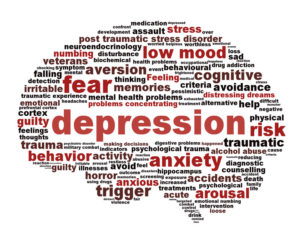 There have been several controversies in the media lately about depression that have focused on the “ability” to overcome it. Some believe there is no need for psychiatric treatment and that with enough motivation, faith or incentive depression can be beaten. Others support the need for treatment, including psychotherapy and/or anti-depressant medication, and believe they could not have gotten better, and may have gotten worse without it.
There have been several controversies in the media lately about depression that have focused on the “ability” to overcome it. Some believe there is no need for psychiatric treatment and that with enough motivation, faith or incentive depression can be beaten. Others support the need for treatment, including psychotherapy and/or anti-depressant medication, and believe they could not have gotten better, and may have gotten worse without it.
Unfortunately, when well-known people have their own agendas, it’s usually the negative, controversial and overly dramatic sound bites that make the news. This then results in the average person who may be struggling with depression question whether they are doing the right thing in their attempt to get better. Questions like “Is this all in my head?”, “Should I even be on medication?”, “If I was a stronger person would I be able to deal with this better?” and “What’s wrong with me that I can’t handle this on my own?” are frequently asked in doctor’s offices and elsewhere. Guilt and shame are not uncommon reactions for those who can’t “just get over it.”
The media often offers what seem like simple solutions. They have to be simple since adequate time is rarely spent on complex health issues like depression. For those who have not talked with their doctor or other health professional about depression, these simple solutions can often make things worse because the hopelessness that results when the ‘solution’ doesn’t work increases the depression.
The truth is, some types of depression can be addressed without medical or mental health intervention, but other types won’t remit without treatment. This is probably what causes the confusion between those who say they can deal with it on their own versus those who say treatment is necessary. The type of depression that doesn’t require treatment includes reactions to episodic stressors, like a temporary job loss, bereavement, peer problems at school, separation/divorce, moving or adjustment to life cycle transitions like retirement.
In these situations, a person is typically able to engage in all of the usual daily activities but may experience a sad mood, some intermittent sleep and/or appetite changes, fatigue and less interest in activities.
The types of depression that do require treatment include those that start out in response to episodic stressors, don’t go away and actually get worse and those that are biological or more genetically determined. With the first type, lack of social support or coping skills may contribute to why a reaction to an identifiable stressor becomes more pronounced. If a person has experienced any type of depression in the past or has a family history of depression, they may be more susceptible to more intense episodes of depression.
When the sad mood is felt more often than not, sleep or appetite changes are consistent, interest in activities does not return, problems with concentration or decision making occurs, loss of energy, feelings of helplessness, hopelessness, guilt or worthlessness are noticeable and if thoughts of death or suicide begin, then it is important to seek treatment. If these symptoms do not go away within a few weeks following the stressor, it is likely they won’t remit on their own and will require some type of psychological and/or medication intervention.
Biological or genetically-based depression can occur regardless of stressors and do require treatment, including medication. Typically there is a family history of depression or other mental health problems like anxiety or alcoholism that impacts brain chemistry. At any random time the chemistry can get out of balance and result in a depressive episode. This type of depression can also be triggered by other physical health problems, surgery, child birth or other mental health problems like eating disorders or substance abuse, due to the impact these problems can have on diet, nutrition, weight loss and the metabolic effects of healing.
Regardless of what ‘type’ of depression or how it starts, the important thing is to get it treated if it does not subside within several weeks or it gets worse. Here’s a checklist of symptoms to monitor on a daily basis. Everyone has their own symptom profile, so you don’t have to have every symptom to have depression. The frequency and consistency of symptoms should be taken into account.
Sad, down, depressed, blue mood
Lack of interest in pleasurable activities
Feelings of agitation
Feelings of being slowed down
Difficulty sleeping – too much, too little, restless sleep
Difficulty concentrating
Indecisiveness
Poor memory
Increased or decreased appetite
Fatigue, loss of energy
Feelings of worthlessness
Excessive feelings of guilt
Feelings of hopelessness (nothing will change)
Feelings of helplessness (I can’t change this)
Thoughts of death
Thoughts of suicide, wanting to die
Easily tearful
Mood swings
Irritable, quick temper, anger outbursts
Low self-esteem
Force self to get through the day
Act happy but don’t feel happy
